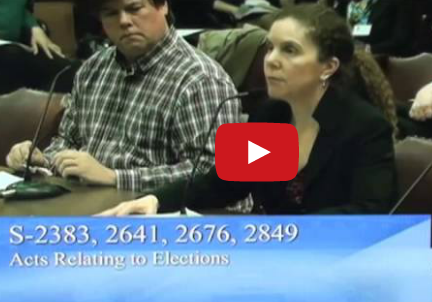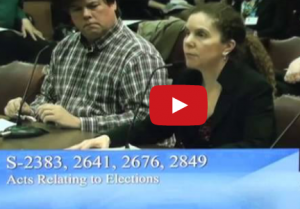 “Before the Voting Rights Act of 1965,” said Jim Vincent, president of the NAACP Providence, “the majority of Black Americans were unable to vote. That’s what was happening in the Jim Crow south… Civil Rights activists fought, bled and died for these rights, and they are being rolled back every day.”
“Before the Voting Rights Act of 1965,” said Jim Vincent, president of the NAACP Providence, “the majority of Black Americans were unable to vote. That’s what was happening in the Jim Crow south… Civil Rights activists fought, bled and died for these rights, and they are being rolled back every day.”
Vincent was speaking at an ACLU panel discussion held at the Providence Public Library in August entitled, “The Voting Rights Act at 50: The Promise and The Struggle.” Hilary Davis of the ACLU directed the event, and in addition to Vincent, Kate Bowden of the RI Disability Law Center and Lee Ann Byrne of the RI Coalition for the Homeless attended.
The history of voter disenfranchisement was briefly discussed, as was the Voter ID laws that the RI General Assembly passed a few years ago. Many politicians feel that having to show a picture ID at the polls is not an undue burden, but Hilary Davis pointed out that years ago, many thought poll taxes, now seen as exclusionary, were not a big deal. Poll taxes, Jim Vincent added, “were designed to disenfranchise a whole group of people so that they couldn’t participate in our democracy.”
After the Voting Rights Act was passed 50 years ago, the percentage of registered black voters rose from 25 to 62 percent. More than that, the Voting Rights Act “provided the right to assistance in the voting booth. This allowed the illiterate, or the disabled, to vote,” said Kate Bowden.
For 47 years or so the Voting Rights Act was doing great. “Then states began to role back voting rights,” said Davis, adding that the Supreme Court virtually eliminated the VR Act when they struck down key provisions. “Over night… states started to enact laws to limit access… It was within a number of hours of Supreme Court decision that laws were introduced to limit voting rights.
And these laws are racially biased. Before Obama was elected President, seven states had laws restricting voter rights,” said Vincent. The number is around 25 now, and Rhode Island is not exempt.
“Rhode Island rushed to pass a [Voter ID] law,” said Davis, “Unlike most laws this is based on a couple of anecdotal incidents… Stats show their is virtually no evidence of voter fraud. Mail ballots became easier to obtain, the only place where fraud was found…No one thought that a Democratic [Party majority] state would manage to do that.”
Lee Ann Byrne said that for the homeless population though, “obtaining an ID is important to access many services… it comes at a major expense” and “despite the availability of the free IDs, it doesn’t make sense to get one that is good only for voting.”
Furthermore, said Byrne, “Poll worker training is a bit spotty” on the issue of voting without a permanent address. “We have a highly mobile population, our constituents almost never have an ID that matches their address.” And denying someone the right to vote or forcing them to cast a provisional ballot under these conditions, is not the law.
People can become embarrassed or caused distress at the polls if they can’t be certain about their right to vote. “There is a concern about being challenged or turned down when they make the effort,” said Byrne. To date only about 900 voter IDs have been issued by the Secretary of State’s office. Before the introduction of voter ID in Rhode Island, there were “zero prosecutions for in person voter impersonation’” but since the passage of the law, said Davis, otherwise qualified voters have been turned away.
Being forced to get a photo ID in order to vote, said Vincent, “is a form of poll tax.”
Another issue of voting concern to the ACLU is “prison based gerrymandering.” Right now the 4000 inmates at the ACI are counted as living in Cranston, on Howard Ave. These people are unable to vote, meaning that the citizens in this district have more voting power than people in the rest of the state. Their vote counts as more because there are less people voting in their district.
The state Senate passed legislation to correct this problem, which would count those people at the ACI as living at their home address, but it has not moved in the House.
The panel discussed other issues, such as long lines and long waits at the polls in some districts, which may cause people to lose out on their chance to vote if time is scarce, broken voting machines, lack of childcare at polls, mail ballot fraud, the need for early voting and issues regarding the Board of Elections.
The ACLU recommends two things needed immediately for the needed reform of our elections. First, the ACLU needs people to volunteer as poll monitors. Poll monitors would note when voters are turned away, when equipment malfunctions or when other irregularities occur. Secondly, the ACLU would like to see the voter ID law repealed.
To accomplish the second goal the public needs to talk to our legislators. Too many people think showing an ID at the poll is no big deal, but for the homeless, the disabled or the poor, securing an ID can be a terrific burden. Thoroughly discouraged, eligible voters may decide to skip voting all together, and this can’t be good for our putative democracy.



